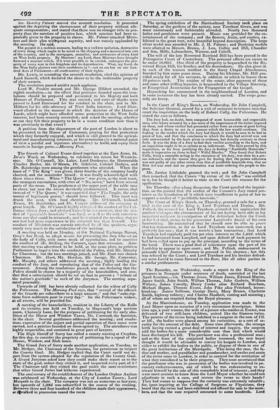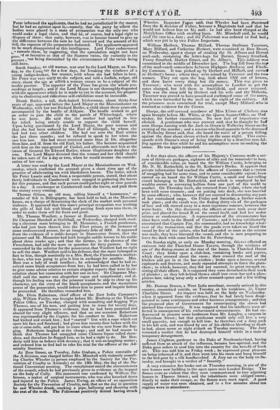The Recorder, on Wednesday, made a report to the King
of the prisoners in Newgate under sentence of death, convicted at the last April Sessions,—viz. Thomas Jones, William Jones, Edward Martin, James Smith, John Smith, William Thomas, John Godwin, William Withers, James Conolly, Henry Cooke alias Richard Beacham, Michael Hagan, Thomas Evans, John Pike alias Pritchard, house- breaking: James Sullivan, George Davis, Mary Brown, Charlotte Smith, highway robbery; and Charles ghadbolt, cutting and maiming; all of whom are respited during the Royal pleasure.
At the Mansionhouse, on Tuesday, application was made to the Lord Mayor upon an occasion of a very uncommon description. Some time ago, a poor woman, the wife of a person who resides at Exeter, was delivered of two still-born children, united like the Siamese twins. The parents of the twins being indebted to a surgeon in the sum of 17/. or 18/., the bodies were placed among his curiosities, as a sort of se- curity for the amount of the debt. Some time afterwards, the strange birth having excited a great deal of interest and inquiry, the surgeon sold the bodies for a more considerable sum than that which would. have discharged his bill. The purchaser was also a professional man; and as the fame of the conjoined bodies increased, the new buyer- thought it would be advisable to convey his bargain to London, and either to exhibit the bodies to the public, or dispose of them to one of the great institutions of the Metropolis. This being the case, the fa,. thee and mother, and grandfather and grandmother, and uncles and aunts of the twins came to London, in order to contend for the restitution of what they considered to be their property. They soon ascertained that the gentleman who was in possession of the bodies was involved in pe- cuniary embarrassments, out of which he was endeavouring to ex- tricate himself by the sale of this remarkable kind of treasure ; and they were most anxious to know from the Lord Mayor whether be could not adjudicate in such a case, and restore the twins to their hands? They bad reason to suppose that the curiosity was extremely valuable; for, upon inquiring at the College of Surgeons or Physicians, they heard that the twins had been exhibited and offered for sale to the mem- bers, and that the stun required amounted to some hundreds. Lord
Peter informed the applicants) that he had no jurisdictiolf thV matter, but he had an opinion upon ite.-namely, that the party by Where the -bodies were placed in a state of preparation was the only one who
.could make a legal claim, and that he, of course, had a legal right to ,dispose of them : that party, however, was in honour bound to give up
!the difference between the sum he had received and the amount of his 'thin, the expense of the preparation deducted. The applicants appeared *a be much disappointed at this intelligence. Lord Peter endeavoured
t:b cousole them, by suggesting, that the speculation might not have prowad so lucrative as that of the Siamese twins, the curiosity in the present L'ese being diminished by the circumstance of the twins being still-born.
Sarah Smales',, an old woman, was sent by the Lord Mayor, on Tues- day, to the Comp.ter for a few days, for breaking the windows of a young indigo-broker, her master, with whom she had fallen in love. Sir Peter was very witty on the subject, and told a foolish, vulgar, old story, about the age at which a woman ceases to be a subject of the tender passion. The reporter of the Times has given the whole pro- ceedings at length ; and if the Lord Mayor is not thoroughly disgusted with the appearance which he is made to cut in the account, his propen- sity to chattering and ridiculous self-exhibition must be incurable.
Dorah Butler, a tall, dark-haired Irishwoman, about thirty4our years of age, appeared before the Lord Mayor at the Mansionhouse on Wednesday, with her son Richard Butler, a child about three years old, accompanied by the beadle of Aldgate. The beadle wished to get an order to pass the child to the parish of Whitechapel, where he was born. He said that the mother had applied to him for relief, being utterly unable to support the child herself. Upon being questioned by the Lord Mayor, the poor woman said that she had been seduced by the Earl of Glengall, by whom she had had two other children. She had not seen the Earl within 'the last three months ; and he refused to speak to her when she • saw him last. She bad never received more than 5/. 10s. altogether
• from him, and 3/. from the old Earl, his father. She became acquainted with him on the race-ground of Cashel, and afterwards met him at the ,house of General Sir Edward Butler, whose illegitimate daughter she was. The Lord Mayor directed that the woman and her child should be taken .care of for a day or two, when he would resume the conside- ration of her case.
A letter was read by the Lord Mayor at the Mansionhouse on Wed- nesday, which confirmed the account given a short time ago of the practice of adulterating tea with blackthorn leaves. The letter, which Sir Peter Laurie said was from a respectable person, stated, that about thirty individuals in Camberwell were engaged in gathering the leaves for this purpose, and that each person could gather eight or nine pounds in a day. A cowkeeper at Camberwell took the leaves, and paid them the money every evening.
Thomas Gilson' an old man, calling himself a " bummeree," or retailer of fish in Billingsgate, has been held to bail, at the Mansion- house, on a charge of threatening the clerk of the market with personal violence. It appeared that this man's principal occupation was washing the gills of bad fish with blood, and putting fresh eyes into them, in order to make them sell for fresh and good.
Mr. Thomas Woollett, a farmer at Romney, was brought before Sir Chapman Marshall at Guildhall, on Wednesday, charged with steal- ing a chestnut mare belonging to M. Mounnier, a French gentleman, who had just been thrown into the Fleet prison, at the instance of some undiscovered person, for an imaginary debt of 300/. It appeared from the evidence of a stable-keeper in Stonecutter Street, that the prisoner and M. Mounnier had both brought saddle-horses to his stable about three weeks ago ; and that the former, in the absence of the Frenchman, had sold the mare in question for forty guineas. It was contended by the solicitor for the prosecutor, that Woollett had no right to sell the mare. Woollett said in his defence, that the mare belonged in fact to him, though nominally to a Mrs. Best, the Frenchman's mother- in-law, who was going to give it him in exchange for another. Mrs. Best was a lady of weak intellect ; he acknowledged that be had re- ceived some blank acceptances from her; he had been called in by her to give some advice relative to certain singular reports that were in cir- culation about her connexion with her son-in-law. Sir Chapman Mar- shall said the matter was altogether vague and complicated ; and al- though his feeling was that the prisoner would be able to clear up his character, yet the story of the blank acceptances, and the mysterious arrest of the prosecutor, would induce him to pause and inquire before he proceeded. He therefore remanded him.
Mr. Divie Robertson, chief officer of the East India Company's slip, William Fairlie, was brought before Mr. Broderip at the Thames Police Office, on Tuesday, charged with assaulting and flogging Wye Thomas, one of his men, and putting him in irons for twenty days. It appeared from Thomas's 'evidence, that he had been punished and abused for very slight offences, and that on one occasion Robertson was reprimanded by the Captain for his conduct to him. Robertson had kicked and struck him ; had "started" him with a rope which cut open his face and forehead ; had given him twenty-four lashes with the cat-o'-nine-tails, and put him in irons when he was sore from the flog- ging. Robertson laughed at the charge ; and said he had reason to think that Thomas had smuggled some Chinese liquor called sham - shoo, and therefore he flogged him, as he had a right to do. Mr. Bro- derip told him to behave with decency; that it was no laughing matter ; and ordered him to find bail to take his trial for the offence at the Ad- miralty Sessions.
At Bow Street, on Tuesday, John Graham, a Police constable of the A division, was charged before Mr. Minshull with violently assault- ing Charles Wheeler (a person employed by the Society for the Pre- vention of Cruelty to Animals) on the 13th May; the day of the Na- tional Convention meeting. The complainant stated the circumstances of the assault, which he had previously given in evidence at the inquest on the body of Cully. His statement was confirmed by William Ro- binson, a maker of surgical instruments, who was also knocked down and injured by the Police. James Ewing, an officer of an opposition Society for the Prevention of Cruelty, said, that on the day in question he saw Wheeler drunk, smoking a pipe, hallooing and shouting with the rest of the mob. The Policeman positively denied having struck Wheeler. Inspector Fagan said, that Wheeler had been ttistnisse& from the K division of Police, because a Magistrate had said that he would not believe him on his oath : he had also been Charged at the MatIlebone Office with stealing linen. Mr. Minshull said, he would send the ease to a Jury ; and die Policeman was ordered to find bail; which wits. Vet in by two Police Inspectors.
William Herbert, Thomas Millard, Thomas Stollman Taverner, Mary Millard, and Catherine Herbert, were examined at Bow Street, on Wednesday, upon charge of stealing the St. Albans and Vernet mail-suck, containing the letter-bags for Barnet, Stoney Stratrorci, Fenny Stratford, Market Street, and St. Alban's. This robbery was coin muted in the middle of December last. The bag fell. from the to of the mail-coach somewhere between Highgate Archway and Finch- ley Common. It was picked up by Herbert and Millard; and carried to Herbert's house ; where they were joined by Taverner and the two' - women. They cut open the bag, tbok about 170d. out of letters, and then burnt every thing but die money. This was given to- Taverner; who went with his accomplices to London to get the notes changed, but left them in Smithfield, and never returned. This was the story told by Herbert and his wife and the Millards. Taverner was proved to have passed and exchanged some of the notes, which were forwarded by the mail on the night of the robbery: All the prisoners were committed for trial, except Mary Millard, who is retained as evidence for the Crown.
Sharpe, the self-accused murderer of Miss Ermes of Chelsea. was again brought before Mr. White, at the Queen SquareOffice, on 1$-id nesday, for further examination. No new fact a importance was elicited. A gentleman who was present said, that he thought lie had seen Sharpe dancing with the Jack-in-Green in WellesNy Street on the evening of the murder ; and a woman who lived opposite-to the deceased in Wellesley Street said, that she heard the noise of a person falling' against the door about eleven o'clock on the same night This corre- sponds with Sharpe's story of being frightened by a drunken man fal- ling against the door while he and his accomplices were ransacking the house. He was again remanded.

















 Previous page
Previous page